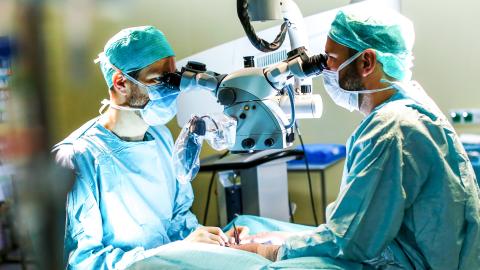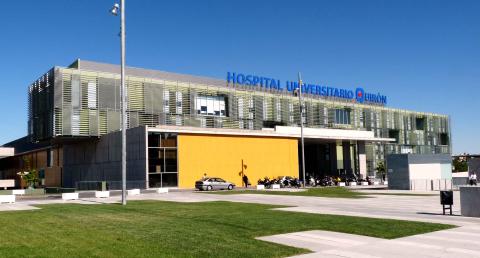Operation 1

Operation at a Helios clinic.
Share
Services
HELIOS Hospital Wesermarsch has gone into operation in a newly built facility in the northern German town of Nordenham. The new hospital building has 120 patient beds, three operating rooms and a hybrid cardiac catheterization lab. Capacity can be increased to 235 beds, if needed. Fresenius Helios invested €36 million in the facility, which took about three years to build, with the County of Wesermarsch contributing an additional €10 million.
HELIOS Hospital Wesermarsch has gone into operation in a newly built facility in the northern German town of Nordenham. The new hospital building has 120 patient beds, three operating rooms and a hybrid cardiac catheterization lab. Capacity can be increased to 235 beds, if needed. Fresenius Helios invested €36 million in the facility, which took about three years to build, with the County of Wesermarsch contributing an additional €10 million.

Operation at a Helios clinic.
Fresenius Helios is investing €14 million to modernize its hospital in Wipperfürth, North Rhine-Westphalia. Starting late this month, two wards will be completely renovated and expanded, with three delivery rooms to follow. To minimize disruptions to hospital operations, the individual renovations are being carried out in sequence. When completed in early 2019, they will provide more comfort for patients and reduce the distances that need to be walked inside the hospital.
Fresenius Helios is investing €14 million to modernize its hospital in Wipperfürth, North Rhine-Westphalia. Starting late this month, two wards will be completely renovated and expanded, with three delivery rooms to follow. To minimize disruptions to hospital operations, the individual renovations are being carried out in sequence. When completed in early 2019, they will provide more comfort for patients and reduce the distances that need to be walked inside the hospital.
Fresenius Helios has opened the new building at its hospital in the western German city of Duisburg. The 22,000-square-meter (237,000-square-foot) structure will accommodate up to 350 inpatients. Construction took two years, with Fresenius Helios investing €50 million in the new building. The move from the existing facility into the new building will start later this month.
Quirónsalud, a unit of Fresenius Helios, is investing about €40 million to build a proton beam therapy center in Madrid. Scheduled for opening in 2019, it will be the first facility of this type for treating cancer patients in Spain. Currently, every patient who can benefit from proton beam therapy must seek treatment outside the country. In proton beam therapy, the use of a high-energy beam allows tumors to be irradiated with lower total doses of radiation and reduced exposure to surrounding tissue compared with conventional radiation therapy. Quirónsalud will also modernize and expand its radiotherapy clinics in Palmaplanas (Mallorca) and Seville.
Quirónsalud, a unit of Fresenius Helios, is investing about €40 million to build a proton beam therapy center in Madrid. Scheduled for opening in 2019, it will be the first facility of this type for treating cancer patients in Spain. Currently, every patient who can benefit from proton beam therapy must seek treatment outside the country. In proton beam therapy, the use of a high-energy beam allows tumors to be irradiated with lower total doses of radiation and reduced exposure to surrounding tissue compared with conventional radiation therapy. Quirónsalud will also modernize and expand its radiotherapy clinics in Palmaplanas (Mallorca) and Seville.

Quirónsalud is Spain’s largest hospital operator. Shown here is the Hospital Universitario Quirónsalud Madrid.
Fresenius Helios closed its €5.76 billion acquisition of IDC Salud Holding S.L.U. (”Quirónsalud”) today, as planned. Quirónsalud will be consolidated as of February 1, 2017.
Of the total purchase price for Spain’s largest private hospital operator, €5.36 billion had already been debt-financed. The balance of €400 million was paid in the form of 6,108,176 new Fresenius shares issued today from authorized capital excluding subscription rights.
Quirónsalud’s network is comprised of 43 hospitals, 39 outpatient centers and about 300 Occupational Risk Prevention centers located in all economically important areas of Spain. The company has about 35,000 employees and offers the full spectrum of inpatient and outpatient care. With the acquisition, Fresenius Helios strengthens its position as Europe’s largest private hospital operator.
This release contains forward-looking statements that are subject to various risks and uncertainties. Future results could differ materially from those described in these forward-looking statements due to certain factors, e.g. changes in business, economic and competitive conditions, regulatory reforms, results of clinical trials, foreign exchange rate fluctuations, uncertainties in litigation or investigative proceedings, and the availability of financing. Fresenius does not undertake any responsibility to update the forward-looking statements in this release.